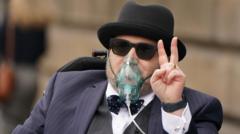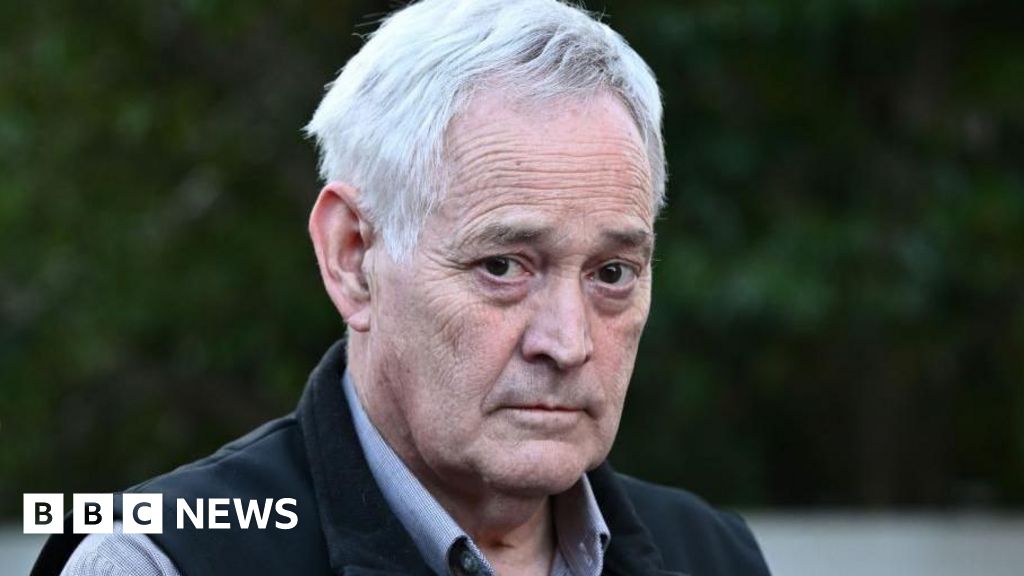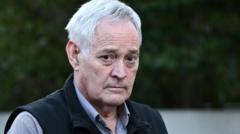In February 2022, I first encountered Nicholas Rossi in Edinburgh Sheriff Court, where he was adamantly fighting extradition to the United States on serious rape charges. Adorned in a three-piece suit and wide-brimmed hat and perched in an electric wheelchair, he claimed to be Arthur Knight, a victim of mistaken identity. His raspy voice, obscured by an oxygen mask, added an eerie tone to his assertions of innocence while he charmingly collected reporters’ business cards, portraying a scene that became all too familiar.
The saga began when Rossi was arrested in December 2021 in a Glasgow hospital, his true identity revealed after staff recognized him from an Interpol wanted notice. He shouted claims of having never stepped foot in the U.S. and maintained he was an Irish orphan. Just weeks after that initial meeting, Rossi sat across from me in a BBC studio alongside his wife, Miranda, weaving tales of his past filled with childhood struggles, yet conveniently lacking evidence like a birth certificate or passport to substantiate his claims.
Listeners of my podcast, part of BBC's Strange But True Crime series, will find it astonishing that while he denied being Nicholas Rossi, he regaled me with stories of surviving a terrorist attack, albeit with the facts awry. Moreover, the revelation came from individuals like Mary Grebinski, who identified him from his history of sexual assault in 2008, and his ex-wife, Kathryn Heckendorn, who recognized the striking pair of red silk pajamas he donned in court.
Born Nicholas Alahverdian in 1987, Rossi rose to local fame as a child welfare advocate before reports of his supposed death in 2020 initiated a web of deception, which crumbled under scrutiny. His online presence ultimately led police to his bedside in Glasgow, where he was recuperating from Covid-19, a health scare that turned fatality suspicions to reality.
The court proceedings were anything but ordinary, marked by Rossi’s theatrical antics and bizarre claims that reflected an erratic defense strategy. Time dragged on as he delivered monologues and staged dramatic medical episodes, causing the judge to conclude that his claims of identity were “implausible.” Even as the extradition process concluded and he was flown to the U.S., Rossi continued his charade, retaining the persona of Arthur Knight until shockingly confessing his identity during an online bail hearing last October.
With Nicholas Rossi's facade now stripped away, he faces serious rape charges in Utah courts in August, having pleaded not guilty to all allegations. What began as an elaborate act of deceit is now a legal battle highlighting the serious implications of his evasion and mythology. The saga persists, revealing layers of complexity around identity, crime, and the pursuit of justice.
The saga began when Rossi was arrested in December 2021 in a Glasgow hospital, his true identity revealed after staff recognized him from an Interpol wanted notice. He shouted claims of having never stepped foot in the U.S. and maintained he was an Irish orphan. Just weeks after that initial meeting, Rossi sat across from me in a BBC studio alongside his wife, Miranda, weaving tales of his past filled with childhood struggles, yet conveniently lacking evidence like a birth certificate or passport to substantiate his claims.
Listeners of my podcast, part of BBC's Strange But True Crime series, will find it astonishing that while he denied being Nicholas Rossi, he regaled me with stories of surviving a terrorist attack, albeit with the facts awry. Moreover, the revelation came from individuals like Mary Grebinski, who identified him from his history of sexual assault in 2008, and his ex-wife, Kathryn Heckendorn, who recognized the striking pair of red silk pajamas he donned in court.
Born Nicholas Alahverdian in 1987, Rossi rose to local fame as a child welfare advocate before reports of his supposed death in 2020 initiated a web of deception, which crumbled under scrutiny. His online presence ultimately led police to his bedside in Glasgow, where he was recuperating from Covid-19, a health scare that turned fatality suspicions to reality.
The court proceedings were anything but ordinary, marked by Rossi’s theatrical antics and bizarre claims that reflected an erratic defense strategy. Time dragged on as he delivered monologues and staged dramatic medical episodes, causing the judge to conclude that his claims of identity were “implausible.” Even as the extradition process concluded and he was flown to the U.S., Rossi continued his charade, retaining the persona of Arthur Knight until shockingly confessing his identity during an online bail hearing last October.
With Nicholas Rossi's facade now stripped away, he faces serious rape charges in Utah courts in August, having pleaded not guilty to all allegations. What began as an elaborate act of deceit is now a legal battle highlighting the serious implications of his evasion and mythology. The saga persists, revealing layers of complexity around identity, crime, and the pursuit of justice.






















